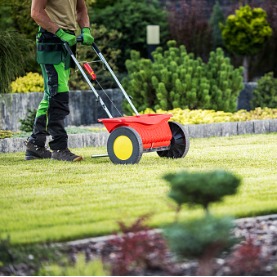
Your Guide To Effective Lawn Care
Aug 26th 2024
As a North Central Florida property owner, achieving and maintaining a healthy, lush lawn is integral to the aesthetic, economic, and functional values of your property, but it can also be a process that poses unique challenges. A variety of factors, such as unpredictable weather patterns, pest infestations, and environmental conditions, can make lawn care a challenge for homeowners and commercial property owners alike.
But don't worry! Our Gainesville landscaping experts have you covered with this helpful guide to effective lawn care! With these proactive tasks, the right local lawn services, and the proper know-how, you're sure to find the most effective lawn care practice for your property's needs. Contact our Gainesville, FL, landscaping company today for a free estimate!
Professional Lawn Care
When you see a rich, bright green lawn, you might not think it requires much care, but it's often harder than it seems to grow and sustain a healthy, beautiful lawn. Whether you have a commercial or residential property, lawn maintenance is a multi-step process performed throughout the year that extends far beyond cutting and watering your lawn.
In fact, different grass varieties, such as ornamental grasses in Florida, require specific care, especially as factors like climate, location, and pests can affect how the grass develops over time. Working with a professional lawn service company, such as Evergreen Lawn Care, lets you rest easy knowing that your lawn is well cared for with our comprehensive range of lawn care services. From hedge trimming and sod installation to commercial and residential landscaping customized to the unique needs of your property, we have you covered!
Mowing & Watering
Among the most important lawn care essentials are mowing and irrigation. We recommend mowing high, as keeping the grass taller can help improve the health of its roots. Though this varies depending upon the variety of grass you have on your lawn, there is typically a 1-to-1 ratio between the grass height and the depth of its roots. When done correctly, mowing can enhance any lawn's health and appearance. But when it's done poorly, it can set back lawn care progress by weeks or months at a time.
Ensure the blades on your lawn mower are as sharp as can be to get a proper cut. Like mowing, irrigation is critical to keeping your lawn nourished. Ensure that your lawn gets enough water to thrive but not too much water so that it develops a reduced ability to handle stressful conditions. Observe your lawn for signs it's time to irrigate; if you notice folded leaf blades, a blue or gray tone to the blades, or footprints visible when you walk on the grass, it's time to water! Water less frequently but deeply to encourage deep root growth and penetration into the soil.
Aeration
Aeration involves loosening up compacted soil in order to allow the roots of your grass lawn to develop. Also sometimes referred to as spiking, aerating your lawn aids grasses suffering from compaction. Soil can become compacted when it's constantly trampled on, driven over, or due to other causes. When soils compact, oxygen is unable to penetrate the soil and reach the roots of the grass, resulting in an unhealthy, aesthetically unpleasing lawn.
You will use a lawn aerator to aerate your lawn to punch small holes into the soil. Then, you will dethatch the lawn, which involves removing accumulated dead grass and other organic matter from the lawn. Aeration can help your lawn absorb essential nutrients, water, and oxygen, substantially improving its health.
Soil Testing
For any lawn, its grass is only as healthy as its soil composition. Thus, knowing the condition of your soil is integral to growing a healthy and full lawn. Soil testing is critical for successful lawn care year-round and can help you determine your lawn's nutrient levels, pH balance, and whether there are any deficiencies in your soil. Ideally, your soil should have a pH range of 6.0 to 7.0 for optimal grass growth.
If your soil has certain nutrient deficiencies, you can provide it with the appropriate amendments and fertilizers to restore the soil to optimal health. When applied to deficient soil, soil amendments can be essential. Common types of soil amendments include organic matter, like mulch, for improvements to the soil's structure, limestone for soils with too-high acidity, and sulfur for soils with an alkaline reading.
